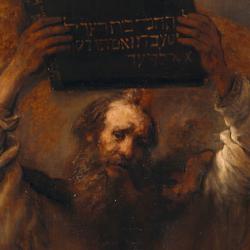The eighth word prohibits stealing, but in Scripture the word “steal” (Heb. ganaph) and the concept of “theft” covers more territory than we might assume.
1) There is a cluster of uses of ganaph in Genesis 31 (8x). Laban accuses Jacob of “stealing” away (vv. 20, 26-27), perhaps a reference to his furtive departure, like a thief in the night. Rachel steals her father’s teraphim (vv. 19, 30). In his defense, Jacob reminds Laban that he bore the cost of animals that were killed or stolen (v. 39).
As Claus Westerman notes, Jacob’s entire speech is a of a laborer against an abusive employer: “the accusation that Jacob makes against Laban is concerned with the unjust exploitation of the labor of a subordinate by one in power. This is so important to the narrator that he puts it into the center of the conflict and uses it to show God’s intervention on behalf of the weak [by multiplying Jacob’s flocks]. The link with two traditions is clear: on the one hand with the laments of the ‘poor’ in the Psalms, on the other with the social accusations of the prophets. It is surprising that already in the patriarchal stories the God of the fathers is the one who stands by the weak and the one to whom the weak can have recourse when oppressed by the powerful” (quoted in Miller, Ten Commandments, 333).
Jacob doesn’t accuse Laban of theft, but the context suggests a clash of competing accusations of stealing. But Laban’s stealing takes the form of changing wages, demanding restitution for lost property, squeezing all the labor he could from Jacob.
2) Joseph got to Egypt because he was “stolen” (Genesis 40:15). Man-stealing is mentioned a few times in the law (Exodus 21:16, the first use of ganaph after the eighth word; Deuteronomy 24:7).
That usage is worth a moment’s reflection. After all, in a case of kidnapping, it’s not clear who is the victim of the theft. From whom was Joseph “stolen”? He says he was taken “from the land of the Hebrews,” but we probably shouldn’t press the suggestion that Joseph belonged to the land. Certainly, he was taken from his father; man-stealing is theft from a family, perhaps a people, to whom a man “belongs,” to whom he is “proper.” Perhaps we should understand that what was stolen was Joseph’s freedom.
We might also ask, Who were the thieves who stole Joseph? Presumably his brothers. They took him, treated him as their property, sold him for money. But are the Ishmaelite traders also guilty of man-stealing?
The law requires restitution for most forms of theft, but demands the death penalty for man-stealing. That suggests that man-stealing is a kind of murder. But it might also point in another direction. Proverbs 30:9 suggests that stealing “profanes the name of my God,” thus linking theft with violations of the third word. Perhaps we should see man-stealing as a kind of sacrilege, an intrusion on and theft of Yahweh’s property. It’s a violation of holiness in the way blasphemy is, and so is punished severely. Man-stealing is Achan-like stealing, stealing from God.
That suggests, further, that Jim Jordan is correct to find parallels between the first five and last five of the ten words: The prohibition of idolatry matches the prohibition of murder, which assaults the image of God; the prohibition of images provokes Yahweh’s jealousy, and thus links the second commandment to the seventh; and the warning against taking Yahweh’s name lightly matches the eighth commandment (Jordan cites the parallel of theft and false oaths in Zechariah 5:4 as a supporting clue).











